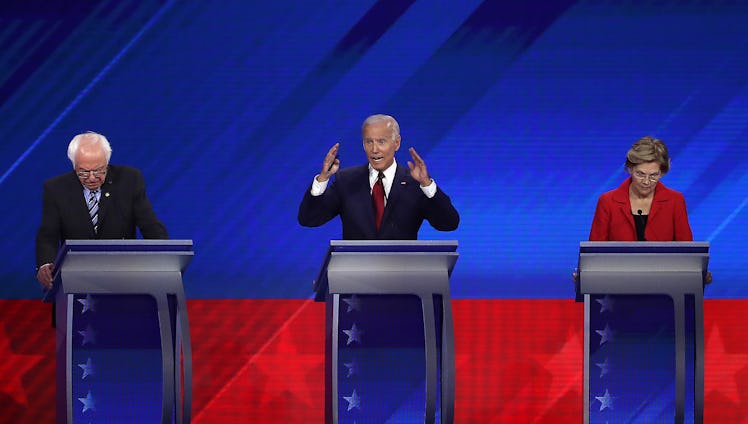
Twitter Is So Not Happy About Joe Biden's Response On Race & Segregation
Former Vice President Joe Biden has already taken a lot of hits from fellow Democrats in the 2020 presidential race, and now he's getting it from social media too. During the Democratic debate on Sept. 12, moderator Linsey Davis asked the former vice president about a comment he made years ago regarding inequality, race, and segregation, and let's just say it did not go fantastic. Twitter users, at least, were not impressed by Biden's response on race and segregation.
In 1975, Joe Biden told a Delaware-based newspaper that he did not "feel responsible for the sins of my father and grandfather" when it came to slavery and racism. "I feel responsible for what the situation is today, for the sins of my own generation," Biden said back in 1975, when talking about school segregation. "And I’ll be damned if I feel responsible to pay for what happened 300 years ago.”
Throughout his political career, Biden has faced extensive criticism for that comment, and the Sept. 12 Democratic debate was no exception. On Thursday night, Davis quoted this remark back at Biden, and then asked the former vice president, "As you stand here tonight, what responsibility do you think Americans need to take to repair the legacy of slavery in our country?" In response to Davis' question, Biden delivered an extensive and not entirely clear response that started with a comment about "institutional segregation" in schools. He then went on to say that parents should "play the radio, make sure the television, excuse me, make sure you have a record player on at night,” to educate their children, and suggested that social workers should help parents “deal with how to raise their children." He also briefly pivoted to a discussion of Venezuelan President Nicolás Maduro. Elite Daily reached out to the Biden campaign for any additional comment on his response and the criticisms of it, but did not immediately hear back.
During his response, Biden also talked about education, increasing teacher salaries, exposing "kids coming from ... a very poor background" to more words and vocabulary. Kids from "a very poor background will hear 4 million words fewer spoken by the time" they get to school, Biden argued in an apparent attempt to address education inequality.
Twitter was not very pleased with Biden's response on race and segregation, as the following tweets illustrate:
Some Twitter users, meanwhile, mocked Biden's mention of record players when trying to answer the question:
Biden's response on racism and segregation faced widespread scrutiny, but it was not the only notable aspect of the night. The first two Democratic debates of the 2020 election cycle were both two-night events, with frontrunners scattered across both nights. Ahead of the Sept. 12 debate, however, the DNC implemented new rules to limit who could qualify for participation. Only 10 candidates were able to meet the DNC's updated terms, which meant that the latest debate was the first to be a one-night affair.
As a result, all of the Democratic frontrunners and major candidates shared the same stage, and the high-profile matchup was met with widespread anticipation. It was the first time, for example, that Biden and Massachusetts Sen. Elizabeth Warren appeared on the same debate stage this election cycle. Biden's podium was also positioned right between Warren and Vermont Sen. Bernie Sanders — two progressive candidates who have been critical of Biden's top-dollar fundraiser appearances and his stance on health care.
Prior to the Sept. 12 debate, the DNC issued a requirement stating that candidates needed to achieve at least 2% in four different polls and receive donations from 130,000 different people, per Vox. Because of these new rules, multiple candidates who participated in the last two debates — such as New York Mayor Bill de Blasio and author Marianne Williamson — didn't qualify this time around. But they might still have a shot in October; the DNC said that if candidates can meet the same requirements by Oct. 1, they can participate in the fourth round of Democratic debates later that month.
Although the 2020 election is still far away, the competition is heating up as major candidates confront one another on key issues. It's still not clear if any candidate is an obvious contender for the Democratic primary nomination, but more hard-hitting questions and confrontations like the ones Biden faced on Thursday may be the key to figuring out who will be be the nominee. Tune back in summer 2020 for the final answer!